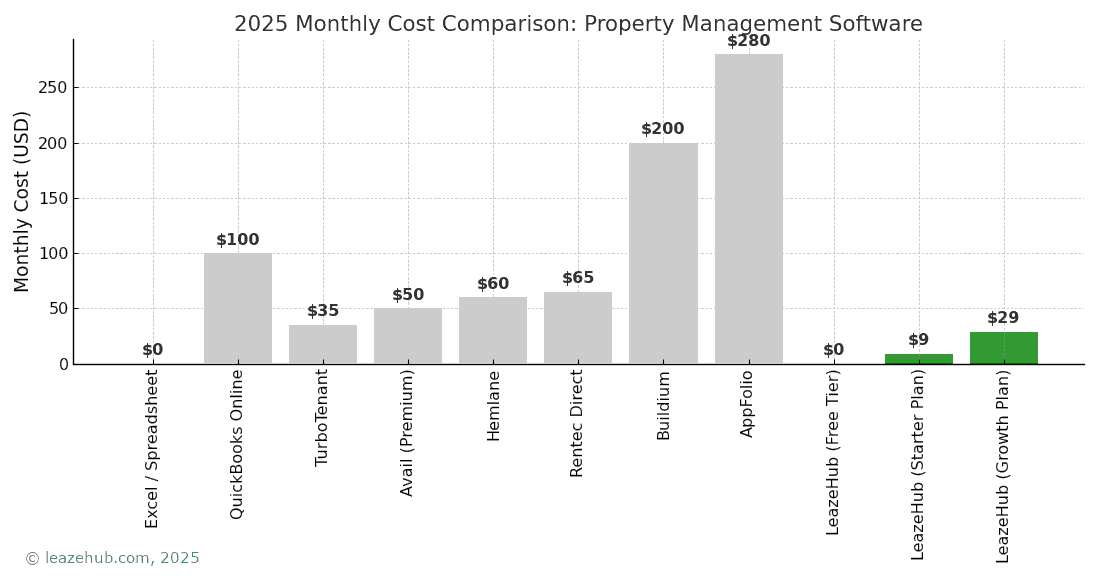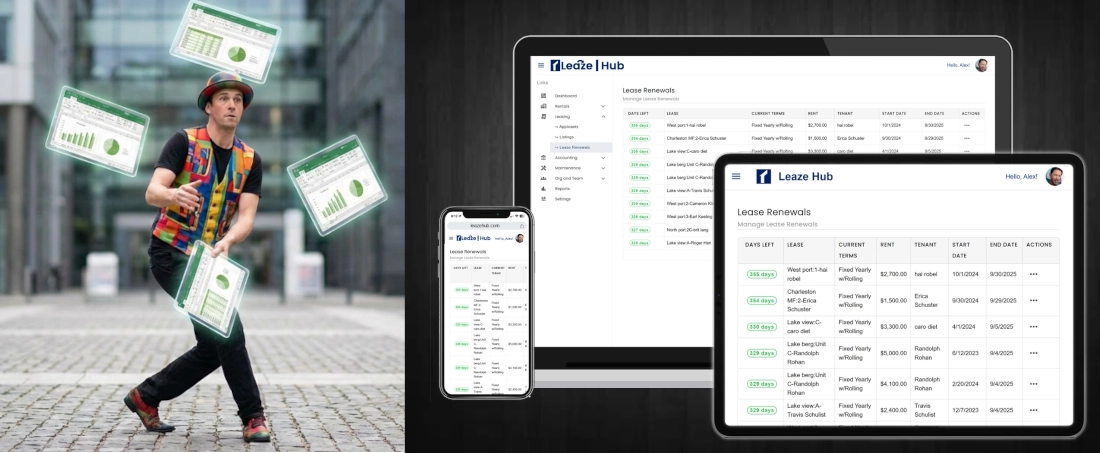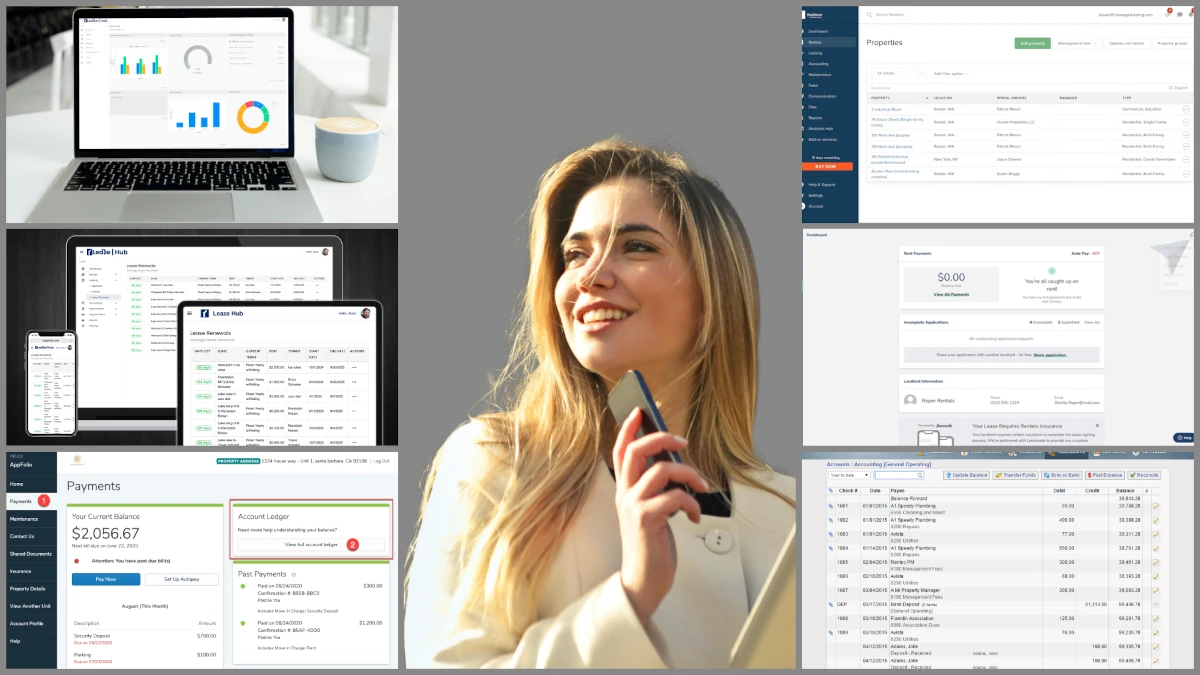· LeazeHub Team · Property Management Software · 9 min read
How Much Does Property Management Software Cost?
Compare property management software cost—from Excel and QuickBooks to Buildium, AppFolio, and LeazeHub—plus per-unit pricing, add-on fees, and what you really pay as you scale...

Understanding Property Management Software Costs
Property management software costs can range from free DIY solutions to hundreds of dollars per month for enterprise systems. The price you’ll pay depends on factors like the number of units managed, included features (accounting, maintenance, etc.), and the vendor’s pricing model (flat fee vs. per-unit pricing). It’s crucial for small landlords and property managers to understand these costs so you can choose a solution that fits your budget and portfolio size.
Many property management solutions advertise low starting prices, but be wary of hidden fees. Some require extra payments for add-on features like e-signatures, online payments, or advanced maintenance tracking. Always consider the total cost of ownership, including any per-unit fees or charges for additional services. Below, we break down the cost of different property management software options — from using spreadsheets to leading industry platforms — so you can make an informed decision.
How Much Does Property Management Software Cost?
When answering “How much does property management software cost?”, it helps to compare a few popular options side by side. Costs vary significantly: some basic tools are free, whereas feature-rich platforms can exceed $300 per month. Here’s an overview of various solutions and their pricing models:
Excel or Spreadsheets (DIY)
Using Excel or Google Sheets is essentially free (aside from your time and any Office 365 subscription). However, manual spreadsheets can become time-consuming and error-prone. They lack automated features for rent reminders, maintenance requests, or tenant communication. In fact, relying on pen-and-paper or spreadsheets often compound inefficiencies in management — especially now that 72% of tenants prefer digital communications and 80% prefer paying rent online1.
While the software cost is $0, the hidden cost is the extra labor and potential mistakes.
QuickBooks (Accounting Software)
Some landlords use QuickBooks as property management bookkeeping software to track income and expenses. QuickBooks Online plans range roughly $30 to $200 per month depending on the edition and features2. It’s great for general accounting, but limited property management features mean you’ll still handle tenant tracking, maintenance, and leases outside the system3.
In other words, QuickBooks (or similar accounting software) can add bookkeeping capabilities, but you might need additional tools or extensive customization to manage rentals effectively. This can increase your overall costs and workload.
Avail and TurboTenant (Freemium Tools)
Online platforms like Avail or TurboTenant advertise themselves as free property management solutions for independent landlords. They do offer free basics (like listings or simple tenant screening), but advanced functionality often isn’t truly free. For example, Avail’s premium features (such as online lease signing or automated payments) cost about $5—$9 per unit in practice4.
Similarly, TurboTenant may “nickel-and-dime users for premium functionality”, charging per feature or transaction4. The bottom line: these can be affordable for a few units, but costs add up as you grow or as you enable more features.
Buildium Property Management Software
Buildium is a popular full-service platform geared toward professional property managers. It uses tiered plans (Essential, Growth, Premium) with pricing that increases for larger portfolios. In 2025, Buildium’s plans often start around $200 per month and can scale beyond $300 for premium packages5.
Its entry-level Essential plan starts at about $58 for a small portfolio, but costs rise sharply for more units and advanced features6. Buildium also has add-on fees: for instance, the basic tier charges extra for e-signatures and certain transactions. If you have a mid-sized portfolio, you might end up paying a hefty monthly fee plus per-unit charges or feature surcharges. Buildium is powerful, but small landlords might find it pricey relative to their needs.
AppFolio Property Management Software
AppFolio is another top-tier solution aimed at larger portfolios (generally hundreds of units). Its pricing is typically per unit (around $1.50/unit) with a required minimum monthly spend of roughly $2805.
In other words, even if you have just 50 units, you’ll still pay the minimum fee. AppFolio offers robust features (accounting, maintenance, marketing, etc.), but the high minimum cost makes it an overkill for small portfolios. It’s designed for scalability — great for large property management firms, not so cost-effective for an independent landlord with a handful of apartments.
Hemlane, Rentec Direct, and Others
There are several mid-range property management software options that combine a base subscription with per-unit pricing. For example, Hemlane and Rentec Direct offer full-service management features with monthly base fees (often in the $30—$60 range) plus additional charges per unit under management4.
These hybrid models can be reasonable at first but “add up quickly” as you add more properties. Always calculate your cost at the current portfolio size and a future larger size. A plan that’s $40 + $2/unit might seem cheap for 5 units, but if you plan to grow to 50 units, that would scale to $40 + $100 = $140/month. Keep an eye on how the pricing model will affect your expenses long-term.
Flat vs. Per-Unit Pricing
It’s worth noting the difference between flat pricing (a fixed rate for a range of units) and per-unit pricing (cost grows directly with each additional unit). Platforms like Buildium or AppFolio commonly use per-unit or portfolio-size tiers, which can feel like they penalize growth. Some even impose setup fees or charge extra for each additional feature or user. In contrast, newer solutions are shifting toward flat, transparent pricing to simplify budgeting for landlords. Always review if things like maintenance tracking, electronic signatures, or owner/tenant portals come at an extra cost on a given platform.
Why LeazeHub Is Different: All Features at a Flat Price
LeazeHub (leazehub.com) stands out as a budget-friendly, all-in-one property management and accounting software designed for small landlords and boutique property managers7. Its pricing is very straightforward and transparent. LeazeHub offers a generous free tier and flat monthly plans, without the “bells and whistles” upcharges that some competitors use:
Free Tier
Manage up to 5 units for $0. All core features are included even in the free plan — you get everything from online rent collection and maintenance requests to unlimited e-signatures and full accounting tools at no cost8. There are no hidden fees for using specific features. This free tier is perfect for a new landlord or someone with just a few apartments, allowing you to eliminate spreadsheets and start with professional tools immediately.
Affordable Flat Plans
If you have a few more units, LeazeHub’s next tier is the Starter plan at $9 per month (covers up to 20 units)8. Unlike many competitors, this isn’t $9 per unit — it’s a flat rate. All the features from the free tier carry over (you don’t suddenly have to pay for things like e-signature or a maintenance module — those remain unlimited). Higher tiers scale in reasonable jumps: for example, $29/month for up to 100 units and so on, with an Enterprise plan capping at $99 for unlimited units9.
This predictable tiered pricing means you can budget easily as you grow, without nasty surprises.
No Surprise Add-Ons
LeazeHub avoids the complex per-unit billing and add-on fees that other software use8. You won’t be charged transaction fees for standard ACH rent payments, and both tenants and owners get free portal access (some platforms charge extra for an owner portal or for additional user logins---LeazeHub does not).
Need to store documents or run detailed reports? That’s included too, with no pay-per-use fees. In short, the price you pay is a flat subscription for the features and unit count, not a starting price that doubles after you add necessary functionality.
All-in-One Convenience
Because LeazeHub includes built-in maintenance management, accounting, and communications, you don’t have to pay for separate property management maintenance software or accounting tools — it’s all integrated. This not only saves money (one subscription vs. several), but also saves the headache of juggling multiple systems. For example, LeazeHub’s accounting feature means you don’t need a QuickBooks subscription on the side, and its work-order system handles repairs without a third-party maintenance app. Getting all these features at a flat price can significantly lower the total cost compared to patching together various solutions.
In summary, LeazeHub’s pricing model is flat and fair, designed to give smaller portfolio owners professional-grade features at a fraction of the cost of traditional platforms. Competitors often either charge high monthly fees for full-featured plans or lure you with a low entry price then charge for each additional feature or unit. By contrast, LeazeHub offers an honest pricing structure: free for very small landlords, and just $9/month for most small portfolios, with the comfort of knowing that includes everything you need to run your properties. This transparent approach can translate to huge savings over time and makes it easy to forecast your expenses as your rental business grows.
Conclusion
Property management software costs vary, but the key is to find a solution that delivers the features you need without breaking the bank. For some, a basic spreadsheet or standalone accounting program might work initially — but these come with hidden time costs and limitations. Established software like Buildium or AppFolio provide comprehensive tools but at a price point suited to larger operations. Many small landlords find themselves stuck between clunky “free” tools and overpriced professional software.
LeazeHub fills that gap by offering full-featured property management software for apartments, single-family rentals, and more at a flat, affordable rate. You get modern capabilities (online payments, maintenance tracking, bookkeeping, portals, etc.) without piecemeal pricing. Before committing to a platform, compare not just the headline price but what you’re getting for the money. With LeazeHub’s model (free to try, flat fees as you grow), you can enjoy transparent costs and peace of mind, focusing on managing your properties — not managing surprise software bills.
Ultimately, the cost of property management software should be weighed against the value it provides. A solution like LeazeHub that combines accounting, maintenance, and management features in one package can actually save you money when you consider the alternatives (multiple subscriptions or the labor of doing it manually). By choosing a platform with generous included features and honest pricing, small landlords and property managers can streamline their operations and maximize their ROI. With flat pricing and no hidden fees, LeazeHub proves that you don’t need to pay premium prices to get premium property management tools.
References
Footnotes
Independent Landlords and Boutique Property Managers Adopt LeazeHub as Demand for Property Management Software Surges. Available at: https://markets.financialcontent.com/malvern-online/article/getnews-2025-7-28-independent-landlords-and-boutique-property-managers-adopt-leazehub-as-demand-for-property-management-software-surges ↩
Is QuickBooks Online Right for You in 2025? | RBO. Available at: https://www.remotebooksonline.com/blog/is-quickbooks-online-right-for-small-business-2025 ↩
QuickBooks vs. Dedicated Property Management Software: Choosing the Right Tool for Your Property Business in 2024. Available at: https://www.pickspace.com/quickbooks-vs-dedicated-property-management-software-choosing-the-right-tool-for-your-property-business-in-2024/ ↩
Independent Landlords and Boutique Property Managers Adopt LeazeHub as Demand for Property Management Software Surges. Available at: https://markets.financialcontent.com/malvern-online/article/getnews-2025-7-28-independent-landlords-and-boutique-property-managers-adopt-leazehub-as-demand-for-property-management-software-surges ↩ ↩2 ↩3
Independent Landlords and Boutique Property Managers Adopt LeazeHub as Demand for Property Management Software Surges. Available at: https://markets.financialcontent.com/malvern-online/article/getnews-2025-7-28-independent-landlords-and-boutique-property-managers-adopt-leazehub-as-demand-for-property-management-software-surges ↩ ↩2
Property Management Software Pricing | Buildium. Available at: https://www.buildium.com/pricing/ ↩
Independent Landlords and Boutique Property Managers Adopt LeazeHub as Demand for Property Management Software Surges. Available at: https://markets.financialcontent.com/malvern-online/article/getnews-2025-7-28-independent-landlords-and-boutique-property-managers-adopt-leazehub-as-demand-for-property-management-software-surges ↩
Independent Landlords and Boutique Property Managers Adopt LeazeHub as Demand for Property Management Software Surges. Available at: https://markets.financialcontent.com/malvern-online/article/getnews-2025-7-28-independent-landlords-and-boutique-property-managers-adopt-leazehub-as-demand-for-property-management-software-surges ↩ ↩2 ↩3
Pricing For Everyone. Available at: https://leazehub.com/pricing ↩



